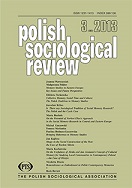Bringing Habermas to Memory Studies
Bringing Habermas to Memory Studies
Author(s): Paulina Bednarz-Łuczewska, Michał Łuczewski, Tomasz MaślankaSubject(s): Social Sciences
Published by: Polskie Towarzystwo Socjologiczne
Keywords: memory studies; Habermas; critical theory; new museology; rationality; public sphere; politics of the past; European memory
Summary/Abstract: In this paper, we attempt to show the fruitfulness of the theory of communicative action for memory studies. Specifically, we intend to demonstrate that concepts characteristic of the discipline, such as “history,” “memory,” and “dialogue,” reflect three types of universal validity claims: “memory” formulates claims to authenticity, “history” formulates claims to truth, and “dialogue” formulates claims to rightness. Thus, it is possible to introduce a seminal Habermasian notion of rationality that rests on validity claims. This notion can serve to integrate, enrich, and identify blind spots in memory studies. Our purpose is to demonstrate the relevance of collective memory to social cohesion (cultural reproduction, social integration, and socialization) and the public sphere (its development and atrophy, rationalization, and colonization).
Journal: Polish Sociological Review
- Issue Year: 183/2013
- Issue No: 3
- Page Range: 335-349
- Page Count: 14
- Language: English

